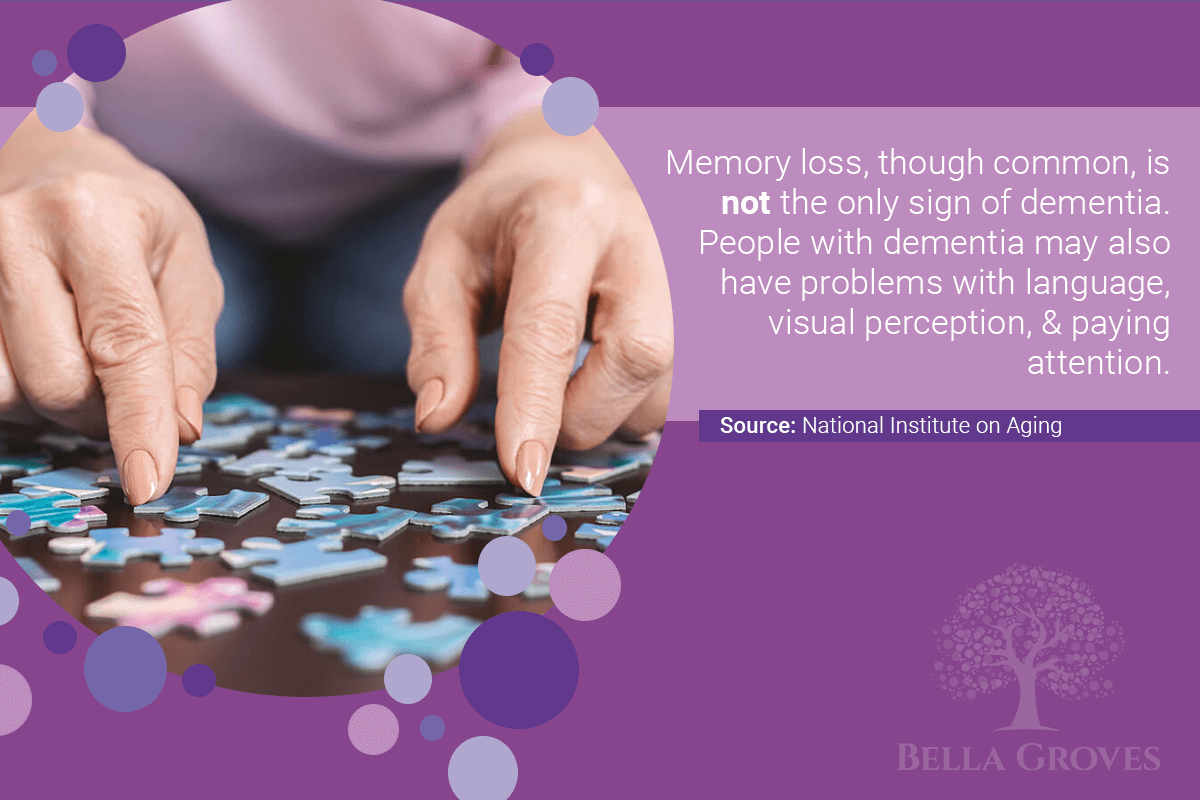
Beyond Memory Loss: Understanding Common Dementia Symptoms
Many people associate dementia and memory loss, overlooking the other symptoms and signs of the condition. This can be a challenging assumption to overcome as memory loss is the most well-known symptom related to dementia.
At Bella Groves, we are committed to being your trusted resource for dementia education, giving you the tools you need to provide loving, effective dementia care. We also offer a residential community in San Antonio for individuals and families looking for additional support and care.
Common Dementia Symptoms Beyond Memory Loss
Personality Changes
A person living with dementia can experience “fluctuating personality changes, becoming extremely confused, suspicious, fearful or dependent on a family member (alz.org).”
These changes may affect the way a person perceives the world around them and also how they express their needs. Just as any person would express frustration when their needs are not being met, a person living with dementia may try and communicate their need and their frustration through varying behavioral expressions.
Beyond expressing their feelings and desires, a person living with dementia may experience changes that affect their mood, coordination, and energy levels.
Trouble Sleeping
Changes to the brain can have many different outcomes, but one of the most common is changes to sleep patterns. For example, a person living with dementia may experience increased restlessness at night, making it difficult to relax and sleep.
One of the best ways to help support a person living with dementia is incorporating routines into their day. While you are building these routines and activities, keep in your mind the entire picture of the day – and how each activity can lead to a better night’s sleep. Changes to the daily routine might include:
- Waking up at the same time each day and getting exposure to natural light as soon as possible.
- Engaging in some type of physical activity twice each day – once after waking and again in the afternoon.
- Include meaningful activities during the day that provide a sense of purpose and use cognitive skills.
- Having consistent mealtimes and eating healthy, nutrient-rich meals.
- Avoiding caffeine, alcohol, and bright lights/screens later in the day.
- Engaging in a wind-down routine each night to begin the sleep process.
By establishing a routine that is repeatable each day, you can help a person living with dementia more effectively manage their sleep patterns and enjoy a more restful night.
Of course, setting routines does not mean you have to be completely rigid about when or where something takes place. At Bella Groves, we believe that flexibility is one of the most important qualities you can have when supporting someone with dementia.
You may discover that your family member sleeps better on a couch or in a favorite chair. We call this the “anywhere bed.” Often caregivers will wake a person and move them to their bed, believing that this is more comfortable and better. However, doing so often creates the disruption in sleep they were trying to avoid.
If your family member has become more comfortable sleeping on a sofa, and it leads to a better night’s sleep, consider being flexible on the exact location of their sleep. Remember that the most important thing is that they get enough sleep at night to enjoy a more restful and successful day.
Depression
Experts estimate that up to 50 percent of people living with dementia experience some form of depression, according to the Alzheimer’s Association. This can be expressed by sadness, agitation, apathy, and a lack of interest in activities that they used to love.
As with all symptoms related to dementia and memory loss, it is important to remember that these changes reflect the physical changes in their brain. Each person is different, and the human brain remains a fascinating and highly unique organ – which means that the same physical changes to the brain might be expressed differently among a group of people living with dementia.
If you are supporting a family member on their dementia journey, it can be challenging to know how to best treat depression. The first thing that you should do is communicate any changes with their healthcare provider or specialist. Together, you can collaborate on treatment options.
Memory Care Options in San Antonio
At Bella Groves, we strive to be your trusted resource for dementia and memory loss education. For a person living with dementia, and the people who love and support them, the journey through dementia care can be challenging and confusing. We are here to help you navigate every step of the journey to become part of your unique story.
To learn more about dementia and memory loss, please visit our website to access educational resources and materials.


